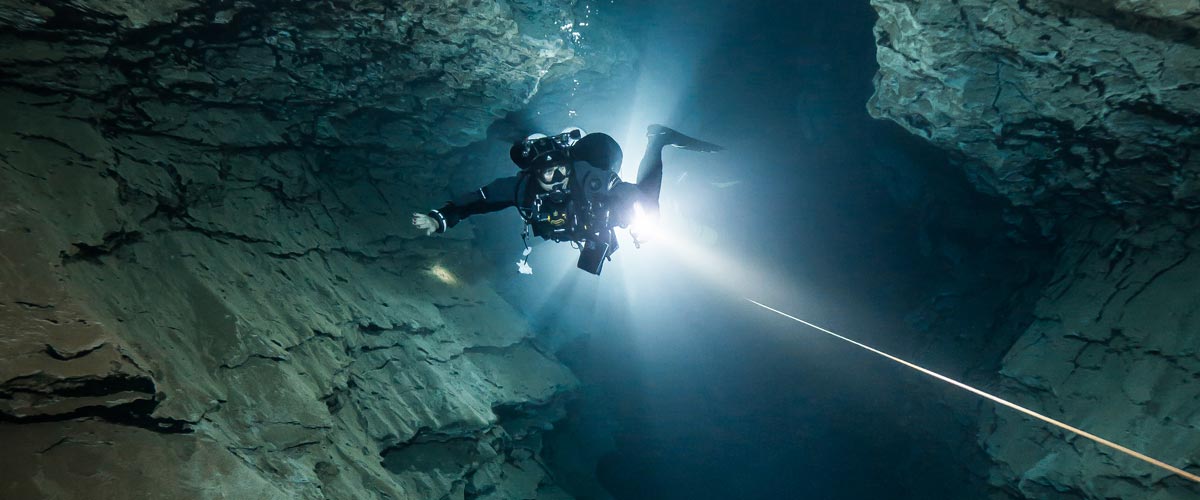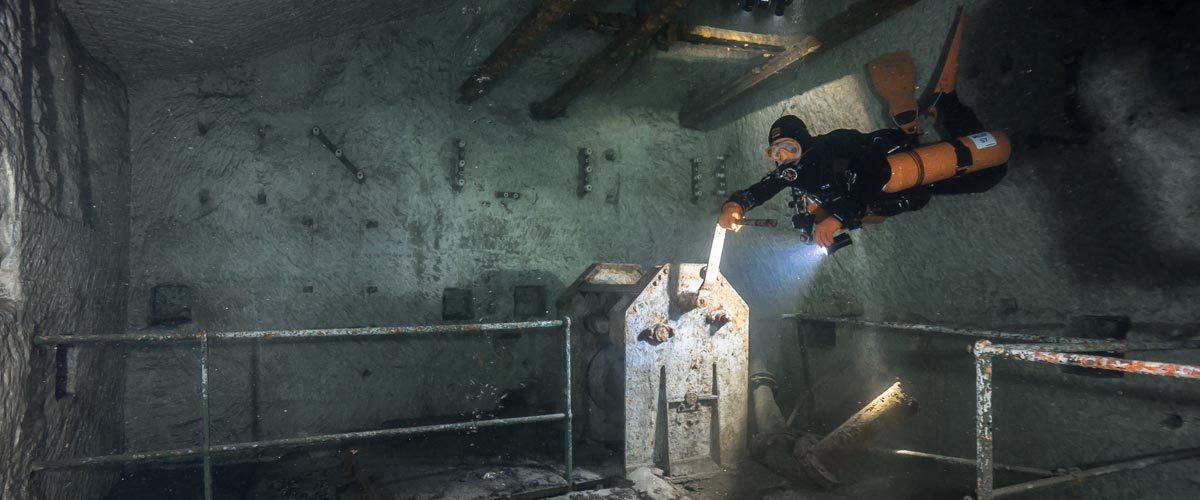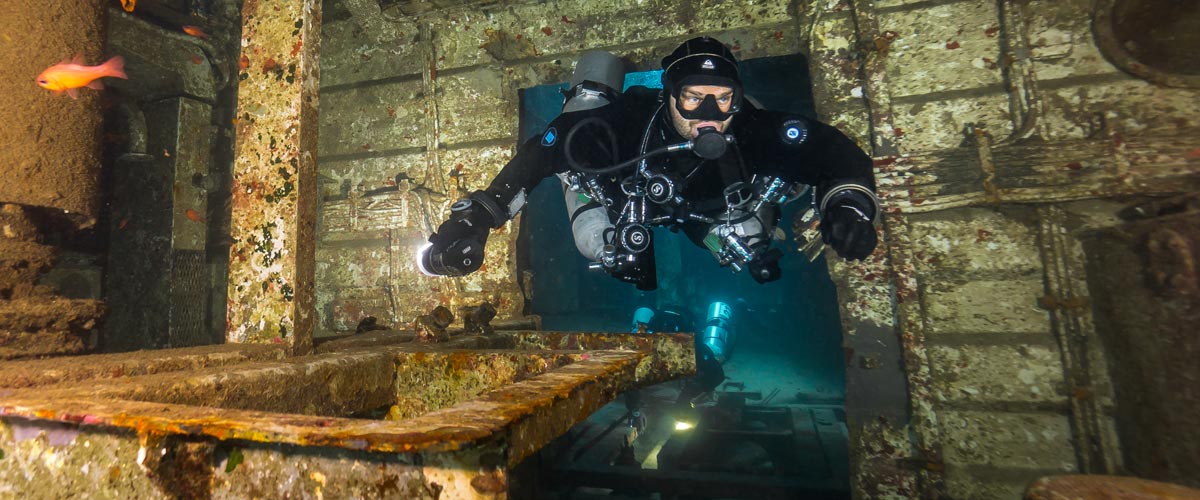Dive Training Blogs
How to deal with Panic
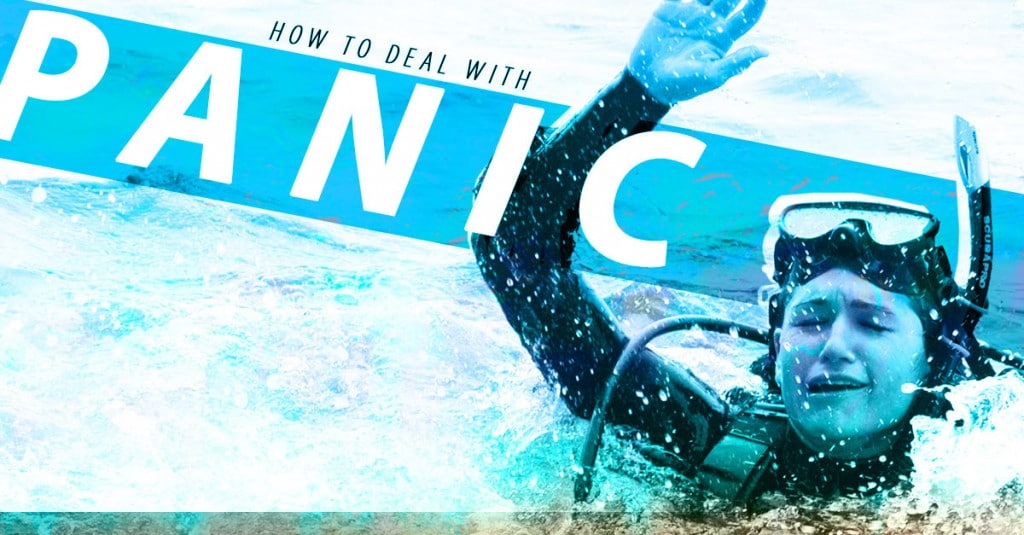
By: Dr. Thomas Powell
We have all been there. Things are going great. You move just a little too quickly or do not take that extra moment to ease your mind and suddenly everything goes wrong. You find yourself trying to cope with a mental barrage of confusion. These moments can be horrifying and, in certain cases, they can have deadly results. Panic is a topic that we all discuss and every instructor wonders about.
When will the day come when I have a student “bolt on me?”
Panic is covered in pretty much all open water scuba training material, but it can also be difficult to simulate. We discuss out-of-air emergencies and we practice different emergency bailout techniques, but we do so without the real fear associated with extreme problems. In training, we know that a professional is near and that at the end of the day we are supposed to be under that person’s care. The real factor that is missing is what happens to your mind during panic. In many cases, we may forget what we have learned and don’t behave in the best manner available to achieve positive results. In reality, how many times have you seen divers practicing emergency skills when they have not been diving for an extended period? Does it seem like most people view refresher courses as an obstacle they do not want to endure? Do you think every diver remembers how to react when they have not practiced scuba-related problem solving since an open water course that took place 10 years ago?
Diver Panic
Imagine yourself as a diver. You have not gotten wet in at least a year because life simply took you other places. A vacation finally arrives and you get the chance to strap on the old dive gear and get back to something you enjoy. As usual, you did not have the time to take a refresher course at your local dive shop before you headed out on your adventure. Work just had to be completed before you left town.
Once you arrive at your destination, you decide you have nothing to worry about and convince yourself there is nothing complicated about diving. That evening, you and your best friend decide to start your week with a simple night dive just off the beach from your resort. A few minutes into the dive, you realize you are burning gas a little faster than you used to, but that may just be associated with your lack of fitness during the past year. You and your buddy have always been about even so far as gas consumption in the water, so in your mind you will be done at about the same time. Simultaneously, you are jealous at all the diving he has gotten to do while you have been dealing with work recently.
Time passes and you are amazed at what you see, but after a bit, you also notice that it takes a little more effort to breathe
You decide that you need to stop and see what is going on with your gear just as your second stage stops delivering air. Your gauge has been the last thing on your mind for the last little bit. Two desperate pulls for air follow and you instantly think you are going to die. You look up, around . . . anywhere for help. The surface seems so far away and that is all your mind can acknowledge. There is no fixing a total loss of air, right? Suddenly, you see your buddy looking at you with a confused face. Things are pitch black with sudden flashes of light. Is it yours? Is it his light? You know there is a signal or some way of showing him that you are in trouble, but there is no time for remembering those actions. You lunge for him, grabbing wildly and hoping for that air you know can save you.
In this case, the diver was excited to partake in a wonderful vacation, but forgot all about using common sense
We as people are not designed to function underwater without a bit of equipment-based support. Even then, gear can fail. This factor is why we focus so hard on good skills, practical knowledge, and muscle memory. We practice those hand signals in class over and over so that they become ingrained in our scuba lifestyle. Similarly, instructors teach us to know how to do things, but we have to take a bit of personal responsibility and continue practicing what we learn. People get rusty at things they do not practice. Panic can overwhelm a person to the point of total shutdown. In our worst moments, we need to have to ability to rely on physical reaction, muscle memory, and the ability to calm the mind in order to solve problems. If we do not practice for bad moments, our physical reaction may become our worst enemy as we blindly grope in terror.
Dive Buddy Panic
Now, using the same story as above, imagine you are the buddy in this scenario. Things have been great. You have been cruising along a little reef seeing all sorts of interesting things. Suddenly your buddy stops cold and he looks a bit lost. You go back to looking around but realize his light is not following. You turn around and see he is wildly flailing. Carefully, you approach him pulling out your alternate air source. It is just a habit you picked up in class watching your instructor. In a lost moment he pauses and seems to recognize you when you use your light to get a clear view of him. He seems to have seen you, but only long enough to lunge toward you. You thrust your alternate air source in his direction and he takes it, ramming it into his mouth. After a moment, you grab the shoulder strap of his buoyancy compensator and give him an “OK” signal. He responds, still acting confused, but you begin your ascent.
This converse storyline to the original shows a diver who recognized a problem, approached with caution, and prepared for secondary issues. The end result was a positive one, but what might have happened if the buddy had not taken the alternate air source? Would the diver have been ready to kick away and recover? Could a potential diver fatality have resulted in two? Was the panicked diver an asset or a risk to the buddy?
Common Sense
Being a diver is a wonderful thing. Not everyone gets to participate in this sport. The problem is that many divers seem to feel that an open water program, or a subsequent class, culminates in diver perfection. This mindset is anything but true. We all have room to improve, develop skills, or even learn new things. The other thing to realize is that just because we learn how to do something once does not mean we will always be masters at those learned skills. The old adage “practice makes perfect” is a good way to view things in the scuba world. The more we practice or work to perfect our scuba skills, the better we will be in both the fun times and the scary times.
In the scenario above, things would have been much easier if the panicked diver had recognized his problem, immediately signaled his buddy, and initiated an air-sharing process. The reality is that even if we do practice these skills, panic can destroy our common sense. We may have to rely on muscle memory. Essentially, if we practice something over and over, our reaction is physically memorized so that you may perform that action without complex thought.
Lastly, we all have to be responsible on a higher level if we are going to play in a realm for which the human body is not designed
In this case, the dive buddy had been able to dive more often than the panicked diver. He was likely aware that there had been no time for the panicked diver to participate in a refresher. When they arrived at their resort, the buddy should have insisted on paying a professional for a bit of his or her time. The panicked diver was not prepared to serve as a proper dive buddy. If someone gets hurt on day one, what good is the rest of the vacation? Are you not there to have fun? Remember that saying “no” is an OK thing to do. In contrast, the panicked diver should have recognized that he was not safe, prepared, and ready. He should have recognized that he was responsible for both himself and the potential safety of his buddy.
Both divers should have been willing to say no to that first unprepared dive
In truth, the reality is that you know your skill set and where you stand. If you are unsure, then find a way to become sure. Otherwise, diving today might not be a good idea. If you are not prepared to be a good buddy, then you and your partner are both already in jeopardy. Diving is supposed to be fun and enjoyable. You do not always have to take the next class, but you could consider simply finding a professional to help you work on your skills until you are again confident in the water. The better prepared we are for the bad times, the more often we will have positive results.
To find out more about International Training, visit www.tdisdi.com.

Blogs
Intro to Tech: What is it about?
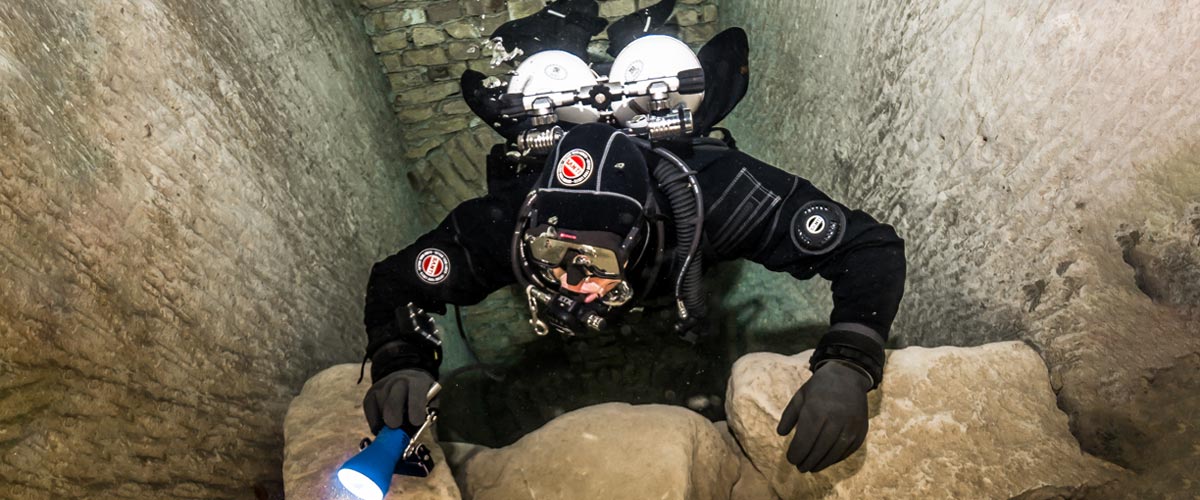
Article by José Pablo Mir
Pictures by Cezary Abramowski
The world of technical diving is exciting. It opens the door to new sites, depths, and bottom times. More importantly, it opens our minds to a new way of planning, facing, and experiencing dives, even those not purely technical.
Becoming a technical diver is a process, and like in other aspects of life, we should find the proper entry point that suits us best based on our knowledge and experience. The Introduction to Technical Diving course from TDI -the world’s largest and most recognized technical diving teaching organization- is the best option for divers who have yet to gain experience in the fundamental aspects of this new practice. The course’s content and its embrace of new techniques and technologies make it possible to acquire a solid foundation to learn and gain experience in this practice properly.
Becoming a technical diver is not something that happens overnight, whether deciding to become one or receiving a certification card stating we are now technical divers. It is a slow process extending farther away than any introductory course. It requires effort and dedication. But it will bring us satisfaction from day one -or two.
It is a matter of mentality
First, we must understand and accept that technical diving, involving greater depths, longer bottom times, exotic gases, virtual or real ceilings, and more, comes with higher levels of risk than the sport diving we have been practicing until now.
Although this discussion usually starts with a warning about risks, as I’ve done in the previous sentence, our practice is not a game of chance.
Technical diving is a rational activity that requires maturity and good judgment, and we will put everything into ensuring that each dive is a successful one -meaning we return from it safe and sound. With this understanding, we will strive to establish a mental attitude more aligned with our practice and its realities.
This new “technical diver” mindset we will develop will lead us to be more cautious in our executions, more analytical in our plans, more rational in our strategies, and more detailed in our procedures.
Experience will keep teaching us to know ourselves better, to keep our anxiety and other emotions under control, and to manage our impulses. Over time, our senses will sharpen, and we will be more attentive to the particulars of the situation we find ourselves in.
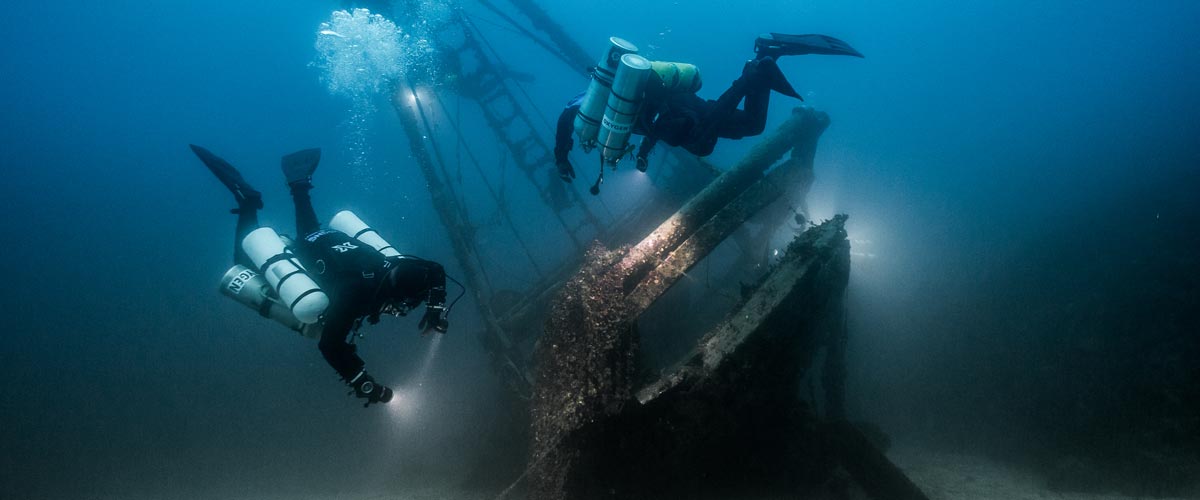
Strategies and procedures
Our strategies, those broad guiding lines tracing the path to follow, from how to approach planning to where, with what, and how we are willing to get there, will be more specific and more practical. Not because they magically become so, but because we will consciously and deliberately frame them that way.
We will establish clear, concise, and realistic procedures. Not only for the undesirable situations that may present themselves but also for those that are part of our dive objectives.
Even though, as technical divers, we often use equipment different from what we were previously accustomed to, it is essential to note that the gear does not make the diver. In a way, we could consider such equipment as the necessary tools to implement what our goal seeks to achieve, according to our strategies and procedures.
Technique plays an important role
We must put our greatest effort into learning and perfecting the different techniques we will be acquiring. Buoyancy, trim, propulsion, cylinder handling, deploying DSMBs and lift bags, valve drills, and more are essential skills we must begin to master to progress in our art. What we cannot do, when we need to do it, can harm us.
Our techniques must be effective and achieve the purpose for which they were devised. But they must also be efficient and require the least resources possible, including the time they take and the effort they demand. Effectiveness and efficiency will prevail over beauty and other considerations that may come to mind, although none of them should be mutually exclusive. A technique executed efficiently and effectively tends to have an inherent beauty.
Refining techniques is a lifelong mission. Some of them will be easy to master from the go; others, on the other hand, will be our life mission and will require many repetitions just to resemble the idea we have in mind of how they should be executed.
We must consider the environment
Our learning, the needs and musts of the practice we engage in, the experience we gradually gain, our strategies and procedures, and even our equipment and tools change with the environment.
Diving in the ocean, everything about us must be suitable for ocean dives. Conditions there rarely emulate those found in a pool, lake, or river. Variable winds and currents, greater depths, visibility conditions, other divers with uncertain skills around us, marine life, maritime traffic, distance from the coast, and many other factors add complexity and uncertainty.
It is never necessary to master the pool on the first day, but planning and aspiring to gradually cope with the ocean’s conditions is essential.
The cost of good training
We are aware that our resources are often scarce in relation to the possibilities of use we could give them if they were not. To a greater or lesser extent, we are part of the economic reality in which we are embedded.
Fortunately, the cost of good technical diver training is not an entry barrier. Comparing training and equipment costs, we see that the former are generally lower. Yes, lower cost for personalized service, essential to our future
performance and safety, than for a series of mass-produced products that are mere, albeit necessary, tools for an end.
The value of good training
The value of the training we received encompasses a range of characteristics, from emotional and methodological to technical and technological. TDI and its Introduction to Technical Diving course offer a deep and modern approach, with a teaching strategy that aims to create thinking divers, not merely obedient ones.
As technical divers, our knowledge is our primary tool. In this type of activity, what we don’t know can harm us.
Is this course optional?
Unfortunately, the fact that this Introduction to Technical Diving course is not a prerequisite for any subsequent training is an invitation to consider it optional. And we all know what usually happens to “optional” under budget constraints.
However, this course should be seen as optional only by those divers who are somehow familiar with the use of technical equipment, who have a mindset more in line with the requirements of this type of diving, who plan and execute the dives the proper “technical” way, who know their gas consumption rate, who are not intimidated by non-decompression tables, who feel comfortable using their dive computers, and know the techniques and have at least an acceptable level of buoyancy, positioning, and propulsion. Those can go straight to a more advanced training course, such as TDI’s Advanced Nitrox.
We must ask ourselves whether or not we are in that group.
Remember our goal: to have fun
Recreational diving is our passion. Jumping into the water carrying heavy equipment and having properly dotted our I’s and crossed our T’s have only one ultimate goal: fun. This is the activity we have chosen as a hobby. We must enjoy it; it must give us pleasure and make us vibrate.
Having a good time is not optional!
Blogs
Four opportunities to go pro in 2024 with Dive Friends Bonaire
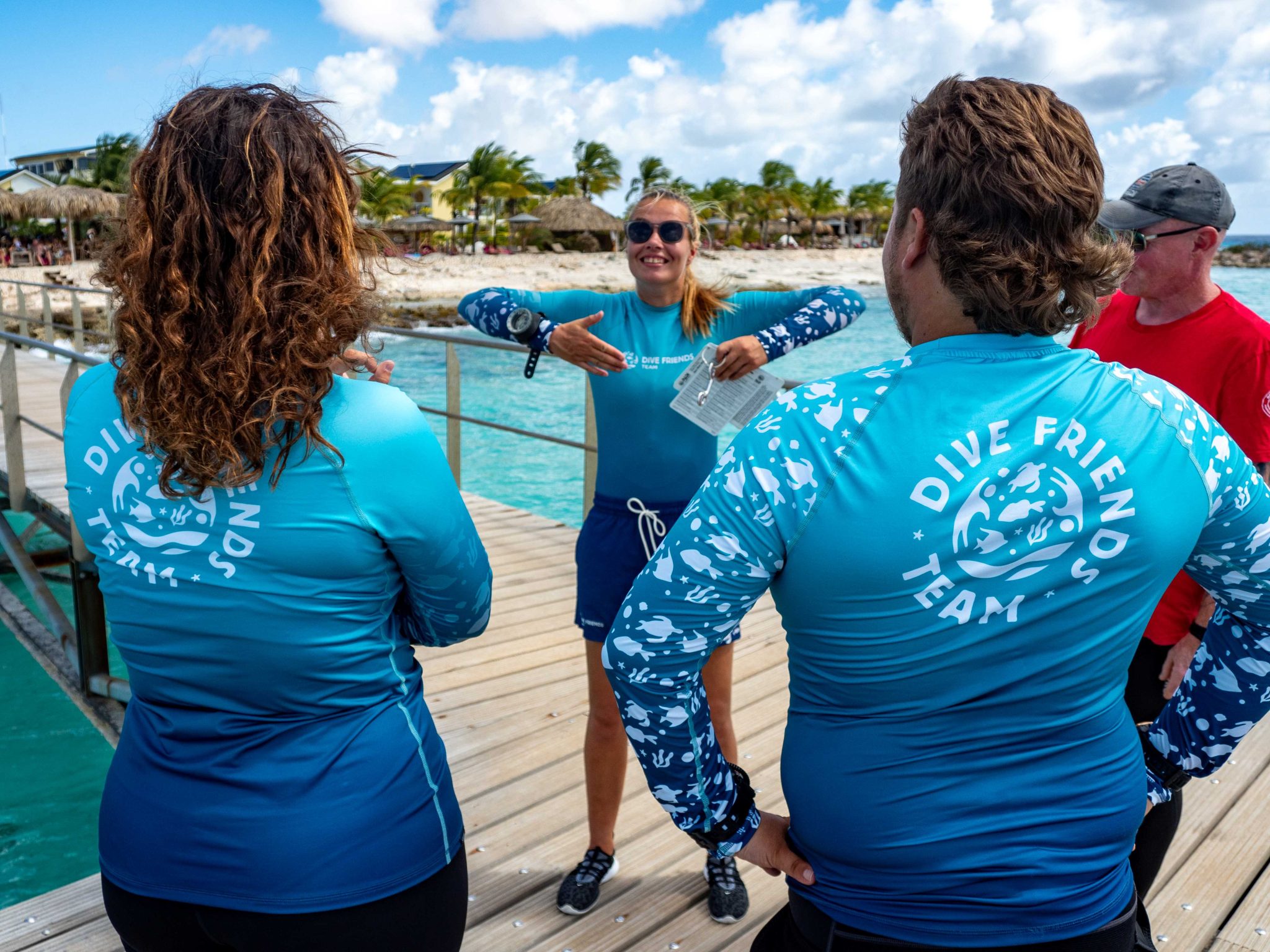
Dive Friends teaches the Instructor Development Course (IDC) several times a year to students who are eager to share their passion for diving with the world.
Dive Friends is known for the personal approach throughout the course. Their in-house course director will lead the students through every essential step, mentoring them to achieve their fullest potential as a dive instructor.
Applications for the following IDC start dates are now open:
- 12 April
- 5 July,
- 20 September
- 29 November
Partnership with Casita Palma
If the student opts for the IDC-Deluxe or IDC-Supreme package, their accommodation will be arranged for them at Casita Palma. This small and quiet resort is within walking distance from Dive Friends Bonaire’s main dive shop location and has everything you need to relax after an intense day of IDC training. Breakfast is included, so the student will always be fuelled and ready for their day.
Contact Dive Friends Bonaire’s Course Director Eddy for more information: coursedirector@divefriendsbonaire.com.
-

 News3 months ago
News3 months agoHone your underwater photography skills with Alphamarine Photography at Red Sea Diving Safari in March
-

 News3 months ago
News3 months agoCapturing Critters in Lembeh Underwater Photography Workshop 2024: Event Roundup
-

 Marine Life & Conservation Blogs2 months ago
Marine Life & Conservation Blogs2 months agoCreature Feature: Swell Sharks
-

 Blogs2 months ago
Blogs2 months agoMurex Resorts: Passport to Paradise!
-

 Blogs2 months ago
Blogs2 months agoDiver Discovering Whale Skeletons Beneath Ice Judged World’s Best Underwater Photograph
-

 Gear Reviews3 months ago
Gear Reviews3 months agoGear Review: Oceanic+ Dive Housing for iPhone
-

 Marine Life & Conservation2 months ago
Marine Life & Conservation2 months agoSave the Manatee Club launches brand new webcams at Silver Springs State Park, Florida
-

 News3 months ago
News3 months agoWorld’s Best Underwater Photographers Unveil Breathtaking Images at World Shootout 2023















